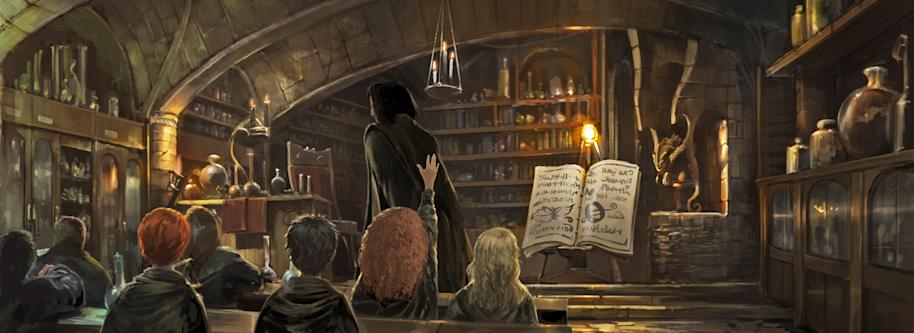
By name, Harry Potter might be the de facto hero of the novels, but Hermione was just as much a hero in her own right. Clearly Harry (and Ron, and probably Neville, too) would have died early into Harry Potter and the Philosopher’s Stone had Hermione Granger, Muggle-born daughter of dentists, not been in the picture. But it wasn’t just her actions that gave Hermione her great importance.
Hermione solidified herself as the nerd of the group from the very start. She was mildly disliked and a little irritating. She was a know-it-all, yes, but what’s wrong with that? This know-it-all attitude was well-deserved. She had an intellect that surpassed everybody else’s; it was often mentioned and well-documented throughout the series. She made us bookworms at home feel like we had a connection with her. How daft Ron must have felt taking the mick out of her in their first Hogwarts year.

In the beginning of Harry Potter and the Philosopher’s Stone Hermione didn’t make the best impression. She gave the boys what-for on the train and continued to not make herself particularly popular – she ended up crying in the girls’ bathroom, after all, because of something Ron had said. By the end of the book, however, she came to realise what was most important (more important, in fact, than potentially being expelled): her friends and her new home. You get the feeling that only then did she find her true place in the world; that she was lonely before she became friends with Harry and Ron, and this representation was so important throughout the novels.
In Harry Potter and the Chamber of Secrets, Hermione proved her worth by solving the quandary of what was haunting Harry in the pipes. She managed to figure it out from only a handful of clues and thus saved her own life – and the lives of many others in the process. While she remained absent from most of the book after being Petrified by the Basilisk, her influence was still very much felt throughout, with Harry and Ron using her knowledge to save the day. They come to realise Hermione’s worth to them both as a problem-solver, but more prominently as their friend.
We all wish we could have been Hermione in her third year, able to afford ourselves more time. The Time-Turner gave Hermione and Harry the tools they needed in order to save both Sirius Black and Buckbeak from certain death. Not only did her smarts allow for their survival, but she also figured out that Lupin was a werewolf long before everybody else, and used this knowledge to save herself and Harry when they realised he was about to head into the woods.

We also saw Hermione slap Draco Malfoy in ‘The Quidditch Final’, later replicated as a punch to the nose in the 2004 film adaptation. And if you say you weren’t cheering her on at least a little, you’re a fibber. Her heroism knows no bounds.
Fourth year was a time of great importance for Hermione Granger. Her appearance at the Yule Ball in particular, in her periwinkle-blue dress (pink in the films) changed the perceptions that many had about her, both in the books and out of them. Becoming Viktor Krum’s date was something of a curveball, as Harry and Ron didn’t even think to ask Hermione to the ball. That aside, Hermione spent most of her year fighting for S.P.E.W., and while very few people believed in her and her mission, it stood to reason that because of this it made for a good argument to get the house-elves on their side during the Battle of Hogwarts. She might have sometimes been a nagging, stuffy know-it-all, but without her so many elements wouldn’t have fallen into place.

You can find a giant example of this during Harry Potter and the Order of the Phoenix. It was Hermione who founded Dumbledore’s Army, convincing Harry to train their peers to defend themselves when their schooling was inadequate. Hermione’s planning and foresight was what brought their friends the skills they required in their time of greatest need. Their practises – the badges for communication, using the Room of Requirement – became even more important as time moved forwards, and all of this was because Hermione started it. She might not have been the best fighter, but she was undoubtedly the head of the operation.
She also chose to make one of the biggest sacrifices in the books: wiping her parents’ memories of her and sending them away so they were safe. The one thing Harry always wanted – a family – she selflessly gave up to help him save the world. It was to keep her mum and dad safe, yes, but she wouldn’t have known then if she would ever see them again. She might have been the greatest witch of her age, but, at heart, she was always the Muggle-born one – which means we can identify with her. Harry was the chosen one, special from the start, whereas Hermione was a hero of her own making.

And this is what truly made Hermione Granger the most important character of the series: her relatability to so many readers. We identify with her. We might have even had the big bushy hair, or enjoyed hiding away in the library during our own school days. Hermione made learning cool, and seeing as school kids can sometimes have you believe otherwise, we were glad of Hermione for that. We didn’t know how to find ourselves, until Hermione showed us. We might not have been aware of it, but we learnt lessons from Hermione as we grew up. Lessons that said that it’s important to be outspoken and stubborn – it can win you even the most difficult situation. Her work ethic, her sheer willingness to do what she believed was right, is inspiring. In short, Hermione Granger was the real hero of the outfit.



